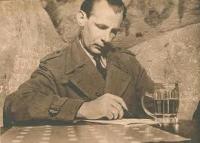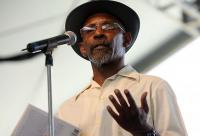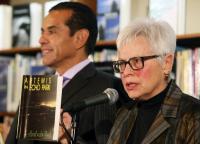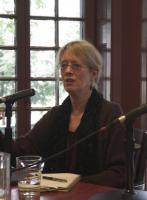December 11, 2012
Edited by David Sanders
Specimen Days
December 11, 2012
1783 – Max von Schenkendorf, German poet, is born.
1817 – Max von Schenkendorf, German poet, dies at 34.
1840 – Kemal Bey, Turkey, poet/author, is born.
1847 – Moritz Grave von Strachwitz, German poet, dies at 25.
1882 – Subramanya Bharathy, Indian poet (d. 1921), is born.
1891 – Johan C J van Schagen, Dutch poet/writer (Narrenwijsheid), dies.
1898 – Nils Ferlin, Swedish poet (Barfotabarn), is born.
1909 – Innokenty Annensky, Russian poet (b. 1855), dies.
1911 – Vincent Henry Kemp, poet, is born.
1941 – John Gillespie Magee, Jr., American poet and aviator (b. 1922), dies.
1972 – Semjon I. Kirsanov, Ukrainian poet (Zolushka), dies at 66.
 Yes, you live without pause
Yes, you live without pause
off the body that’s yours
and then whoosh, one-two-three, that was that.
And in some makeshift dray
you’re then carted away.
There is nothing so special in that.
Should a bird feel the urge to start trilling
at your passing, t’would be almost thrilling.
from “Couplet” by Nils Ferlin, 1898–1961
Poetry In The News
Linton Kwesi Johnson Honoured

The father of dub poetry, Linton Kwesi Johnson, has won the 2012 Golden PEN Award, awarded annually to an accomplished writer, resident in Britain, whose work has had “a profound impact on readers, and who is held in high regard by fellow writers and the literary community.” Previous recipients have included Salman Rushdie, Harold Pinter and Margaret Drabble. Read more at the New Statesman.
Eloise Klein Healy Accepts L.A. Poet Laureate Post in Ceremony

The first poet laureate of the city of Los Angeles accepted her post in a room surrounded by books — books for children and her own slender volumes of poetry. Eloise Klein Healy, 69, was officially named L.A.’s poet laureate in a ceremony Friday at the Central Library downtown. Mayor Antonio Villaraigosa chose Healy from a list of three finalists named by a selection committee and introduced her to the public at a press conference on Friday. Read more at the LA Times.
World Poetry

A Chinese poet says he is shocked and afraid after two members of the Swedish Academy, which awards the Nobel Literature Prize, agreed he should be annihilated. The row took off after a Chinese translation of a poem written by last year’s literature prize winner. Chinese writer Li Li’s version of a Tomas Tranströmer poem replaced the word “chanterelle,” a popular mushroom in Sweden, with the word “caramel.” After Swedish academy member Göran Malmqvist, 88, criticized the translation, Li published a poem on his blog which Malmqvist became convinced was a personal attack. Read more at The Local.
New Books
Book of Dog: Poems by Cleopatra Mathis
[Paperback] Sarabande Books, 64 pp., $14.95
“I love this book! And haven’t been able to say so about any book so unequivocally for a long time. Not only has Mathis found subjects that impel her toward writing that’s both deep and poignant, but she’s not afraid of registering sentiment right up to the almost unbearable edge. The creatures for which she has so much intelligent and well-wrought empathy, we suspect arise out of a profound sympathy with the travails of simply being alive, but there’s no self-pity here, just what feels acute and often painful, and beautiful accuracy.”—Stephen Dunn
City of Rivers by Zubair Ahmed
[Hardcover] McSweeney’s, 72 pp., $20.00
The poems in City of Rivers—the first full-length collection from 23-year-old wunderkind Zubair Ahmed—are clear and cool as a glass of water. Grounded in his childhood in Bangladesh, Ahmed’s spare, evocative poems cast a knowing eye on the wider world, telling us what it’s like to be displaced and replaced, relocated and dislocated. His poems are suffused with a graceful, mysterious pathos—and also with joy, humor, and longing—with the full range of human emotions. City of Rivers is a remarkable and precocious debut.
Diaries of Exile by Yannis Ritsos
[Paperback] Archipelago Books, 120 pp., $15.00
This long poem is a nuanced and moving account of the poet’s time in exile, in which everyday events hide much that is threatening, oppressive, and spiritually vacuous. Lyrical and idyllic, these re-creations of Greek mythology justify Yannis Ritsos’ reputation as one of the most honored in modern Greece. Plagued by tuberculosis, family misfortunes, and persecution for his Communist views, Yannis Ritsos (1909–1990) spent many years in sanatoriums, prisons, and in political exile while producing over one hundred volumes of poems, dramas, and translations.
Odessa: Poems by Patricia Kirkpatrick

[Paperback] Milkweed Editions, 96 pp., $16.00
A grim prognosis, brain cancer, leaves the speaker in Kirkpatrick’s Odessa fighting for her life. The tumor presses against her amygdalae, the “emotional core of the self,” and central to the process of memory. In poems endowed with this emotional charge but void of sentimentality, Kirkpatrick sets out to recreate what was lost by fashioning a dreamlike reality. Odessa, “roof of the underworld,” a refuge at once real and imagined, resembles simultaneously the Midwestern prairie and a mythical god-inhabited city. In image-packed lines bearing shades of Classical heroism, Kirkpatrick delivers a personal narrative of stunning dimension.
So Recently Rent a World by Andrei Codrescu
[Hardcover] Coffee House Press, 352 pp., $35.00
Raconteur, poet, and NPR commentator Andrei Codrescu delivers in his inimitable, irreverent style a collection that traverses subjects from aging to consumerism and religion to mass media. Brilliantly funny yet deeply insightful, these poems illuminate Codrescu’s acerbic tone and outsized personality and capture the best of his oeuvre.
Recent Reviews
Song & Dance
by William Logan
Anne Carson’s new translation of Antigone is a real mess. She has taken one of the most moving plays of the classical world—still charged with pathos despite its remoteness in custom and dramaturgy—and updated it like a new Honda. The Greek tragedies present a problem for modern readers; and translations often don’t help, either mummifying the original, as if the ancients were best viewed in glass vitrines, or throwing the berobed actors into mufti and pretending that all the bloodletting occurred during the Jazz Age. Read more at the New Criterion.
Drawn into a Circle of Poetry Giants
by Michael Dirda
Well, there are poetry-writing classes, and then there’s the 1959 poetry-writing class taught by Robert Lowell at Boston University, with Sylvia Plath and Anne Sexton among the students. Kathleen Spivack was there, too, and she re-creates those heady days in her memoir, With Robert Lowell and His Circle. She also recalls her subsequent encounters with Elizabeth Bishop (with whom she regularly played ping-pong) and Adrienne Rich; the mentorship of Stanley Kunitz and John Malcolm Brinnin (author of the classic Dylan Thomas in America); her friendship with Lowell’s wives, the writers Elizabeth Hardwick and Caroline Blackwood; and the early brilliance of the critic Helen Vendler. Read more at the Washington Post.
The English Iliad by John Farrell
Since the sixteenth century, English translators have been striving to do justice to The Iliad. It is a poem of brutal, relentless violence, but it is a violence without haste. The action unfolds in a boundless, inexhaustible present. Warriors die, but they do not age. The hour hangs at dawn, dusk, noon, or night, without transition. Opponents meet on the field, in the midst of chaos, but there is time to exchange pedigrees or insults without stint. And Homer’s hexameters, with their stately pause at each half-line, proceed with an Olympian pace fitting the detachment of their godly source. The unhurried movement of Homer’s verse plays against the graphic assault and energy of the action, intensifying their effect. Sublime passion and urgency rendered bright and hard, with none of the blur of time. Read more at the LA Review of Books.
Correspondences
Ploughshares/Emerson WLP Reading Series: Adam Zagajewski Q&A
by Ewa Hryniewicz-Yarbrough
The Seeds of Its Own Unfolding

Editorial note: The following conversation has been adapted and edited from episode 15 of PoemTalk, recorded March 9, 2009, at the University of Pennsylvania in Philadelphia, and transcribed by Michael Nardone. In this episode, PoemTalk host Al Filreis discusses Lyn Hejinian’s “constant change figures” with Thomas Devaney, Tom Mandel, and Bob Perelman. Listen to the showhere. — Katie L. Price. Read more at Jacket 2.
Broadsides
Elizabeth Bishop’s Misunderstood Brazil

by Benjamin Moser
Half a century has passed since the Life World Library was launched, in 1961. Today, its volumes languish in Internet bookstores, begging for takers at less than a dollar. They are cheapened by their age, their association with the mass-market Time Life brand (“Mysteries of the Unknown,” “Home Repair and Improvement”) and its suburban, middle-brow readership, though that might be too strong a term: one wonders how many people actually read these picture books. But the Life World Library was once wildly popular, and not without ambition and quality, as the author of the volume on Brazil proves. Read more at the New Yorker.
The Benefits of Poetry for Professionals
by John Coleman
Wallace Stevens was one of America’s greatest poets. The author of “The Emperor of Ice-Cream” and “The Idea of Order at Key West” was awarded the Pulitzer Prize for Poetry in 1955 and offered a prestigious faculty position at Harvard University. Stevens turned it down. He didn’t want to give up his position as Vice President of the Hartford Accident and Indemnity Company. This lyrically inclined insurance executive was far from alone in occupying the intersect of business and poetry. Dana Gioia, a poet, Stanford Business School grad, and former General Foods executive, notes that T.S. Eliot spent a decade at Lloyd’s Bank of London; and many other poets including James Dickey, A.R. Ammons, and Edmund Clarence Stedman navigated stints in business. Read more at Harvard Business Review.
The Man Who Killed Poetry: Joseph Epstein And His Essays

David X. Novak
It is nearly twenty-five years since Joseph Epstein published his now famous essay—or as Dana Gioia referred to it, his “mordant 1988 critique”—under the flashy title “Who Killed Poetry?” (Commentary, August 1988) “A brilliant polemicist,” Gioia wrote, “Epstein intended his essay to be incendiary, and it did ignite an explosion of criticism.” That came from a similar-themed essay written by Gioia less than three years later (also with an interrogatory title), which went on to report: “No recent essay on American poetry has generated so much violently negative criticism from poets themselves [including “an extravagantly acrimonious symposium in the AWP Chronicle (the journal of the Associated Writing Programs)” when it was reprinted]. To date at least thirty writers have responded in print.” Gioia’s essay was similarly popular, and became, for him, a career-expanding impetus. Read more at Contemporary Poetry Review.
Opposing Terms
A Symposium on the Poetic Limits of Binary Thinking
Marjorie Perloff’s essay “Poetry on the Brink” in the May/June 2012 issue rekindled conversation about innovation and canonization in contemporary poetry. To continue and extend the discussion, we cast a wide net and invited 18 poets to address the following question: what is the most significant, troubling, relevant, recalcitrant, misunderstood, or egregious set of opposing terms in discussions about poetics today, and, by extension, what are the limits of binary thinking about poetry? Their responses range from whimsy to diatribe, with meditation, appraisal, tangent, touchstone, anecdote, drollery, confection, wit, and argument in between. Read more at the Boston Review.
Drafts & Fragments
Pier Paolo Pasolini Talks and Reads Poetry with Ezra Pound (1967)
Here’s a collision of cultural figures you don’t see every day: Salo, or the 120 Days of Sodom director Pier Paolo Pasolini sitting down with modernist poet Ezra Pound. Though only eight minutes in length and perhaps not subtitled with ideal fluency, this clip nonetheless hints at the kind of conversation, or conversations, you’d like to have been in the room for. Watch at Open Culture.
Frank O’Hara Being Frank O’Hara
Envoi: Editor’s Notes
Truck Talk
by Alec Wilkinson
Plain language in the service of feeling is congenial to my ear. When I was learning to write, William Maxwell used to tell me, “Use a word from plain speech.” Sometimes he would ask me to explain something I had written, and he would write my explanation in the margin, and it surprised me that something I had said could be writing. When people say something apt, I often have a difficult time getting the sound of it out of my ear—it seems to have an extra legitimacy because it happened—and sometimes it comes out on the page, seeming true and clear to me, because I heard it. Such a remark can take its place for me in a paragraph like a board nailed to a stud. Read more at the New Yorker.
How fun.
Here’s my attempt:
The entry below wasn’t written
as it appears. It’s a listing
from eBay, which my wife sent me.
(She wants a pickup truck.) She thought
it read as a poem, and I
arranged it in stanzas and
fixed a couple of typos and
added a comma. It doesn’t
ask much of the imagination
to picture a man
in Alabama writing it. The truck
is parked in his yard. It is
the evening, after work, and
he has the door
closed against interruptions.
—David Sanders